The Data Protection Act (DPA) 2018 is the UK's updated data protection law which became effective on 25th May 2018 and was recently amended on the 1st January 2021 to reflect the United Kingdom's exit from the EU. It sits alongside the UK GDPR and replaces the Data Protection Act 1998. The United Kingdom is […]
Disclaimer Examples with Samples
What exactly is a disclaimer and why do you need one?
A website disclaimer is a legal statement that helps reduce legal liability for the website that displays it. It identifies areas of your business or website that could create some confusion or misinterpretation from your users and helps to protect the content and services you provide.

On this page
What Do You Need in Your Disclaimer?

Do you need a disclaimer?
Firstly, recognize your need for a disclaimer. If you provide products, services or both then you are going to require a disclaimer. Products are easily identified but services may be more difficult to identify. A service can be providing information, such as articles or other media, or providing assistance such as IT, financial services or medical services.
What might you be you liable for?
Once you recognize the need for the disclaimer, then you will need to give thought to the type of liabilities you might face. If you have any written content on your website, you may face being held liable for the information you have provided. If you sell a product you may face customers claiming they were injured by that product. If you allow comments on your website or social media page you will need to add a disclaimer removing any liability of users content.
What would you like to protect?
Your written and media content is owned by you, this is your intellectual property and as such you would want to include an intellectual property disclaimer. You may also want to protect your logo and any symbols or words that identify your business. Often the copyright and intellectual property disclaimers are found in your terms and conditions agreement.
Examples of Useful Website Disclaimers
We are going to take a look at a host of disclaimers than can be useful in helping reduce legal liability for you and your website. You will find that there will be a number of them that will be suitable for your circumstances and that by combining them all in your disclaimer statement you will effectively cover yourself.
The disclaimers that we are looking at can all be found on our disclaimer generator and they are:
- Consent
- Content
- External links
- Reviews
- Earnings
- Testimonials
- Map policy
- Fair use
- Personal responsibility
- No professional relationship
- Investment
- Affiliate
- Fitness
- Medical
- Legal
- Social media channel
- Blog
- Product
- Price Inaccuracy
- YouTube Video Disclaimer
Consent
The consent disclaimer is one that every website should have. It is a general disclaimer outlining no liability for any damages in connection with your website.
Content

The content disclaimer is used for websites which allow comments from users. It removes any liability and responsibility from you in connection to whatever your users have written.
External Links
Most websites contain links to other websites as a reference. Having an external links disclaimer explains to your users that you do not endorse or assume any responsibility for the information that is found on the third party website.
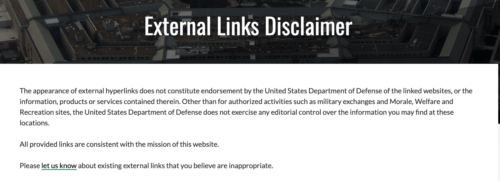
The U.S. Dept of Defense's external links disclaimer is a great example of this type of disclaimer.
No Professional Relationship
If your website provides information on a professional topic such as law, medicine or fitness, then you may want to add this disclaimer. The no professional relationship disclaimer explains to your users that your website content is not a substitute for professional advice and that by using your website their is no professional relationship between you and your user. Your website content is provided for informational purposes only.

A counseling website like the K5 Counseling website is a good example of the kind of professional website that requires a no professional relationship disclaimer.
Investment Disclaimer

The investment disclaimer removes any liability or responsibility from you for providing information relating to investment analysis, news or any other investment related data.
If your website deals in this topic then you are going to want to include this disclaimer.
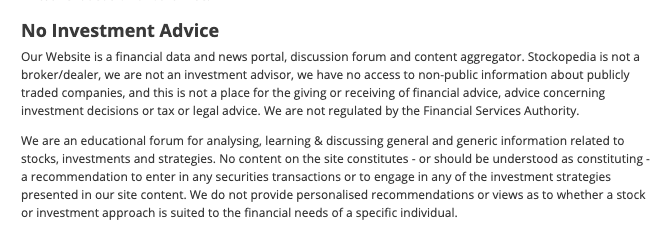
Stockopedia have included a No Investment advice disclaimer on their disclaimer page. This is a great example of type of website that would want to include an Investment disclaimer.
Affiliate Disclosure

If your website contains affiliate links then you must comply with the FTC's policy and include an affiliate disclaimer.


As part of the Amazon Associates Program Operating Agreement you are required to identify yourself as an associate and disclose that you earn money from purchases made through your affiliate links.
Below is an example of a good website affiliate disclosure disclaimer from the website Preppers.com
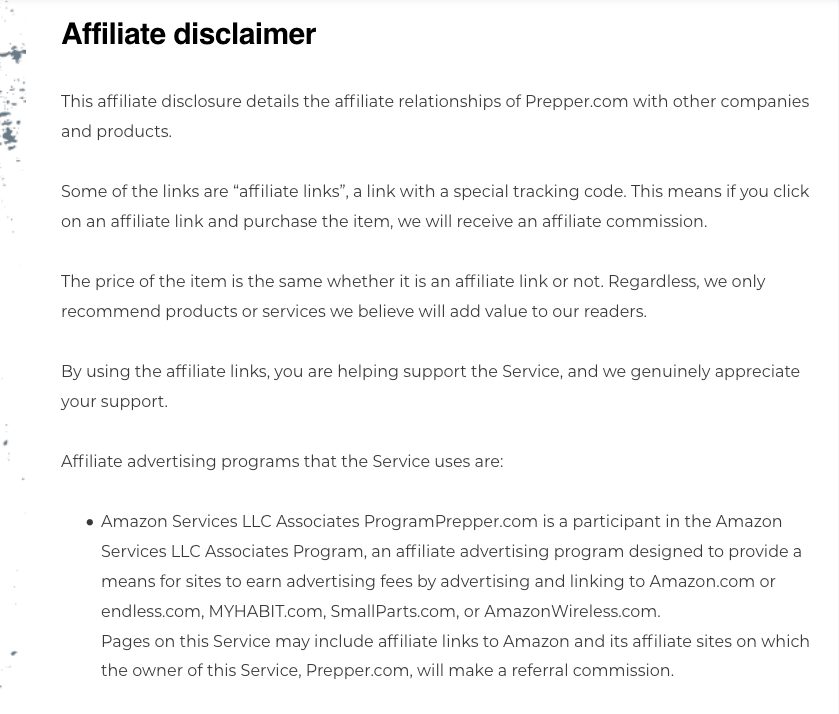
Reviews
The reviews disclaimer is useful for any site that reviews products, services or other resources. It outlines that the reviews are opinions of the author and that the products or services that are being reviewed may be given to the you at a discounted price or for free in exchange for the review. It also discloses that any incentives will be made known to the reader.
A small but effective review disclaimer can be seen in the below screenshot from product review alliance.

Earnings

An earnings disclaimer is a useful addition to your disclaimer page if you are a website that reports the earnings of any of your clients or customers who use your information, products or services. Using positive examples of your services working with other customers does not indicate the success of each individual customer and expressing this via a disclaimer is important.
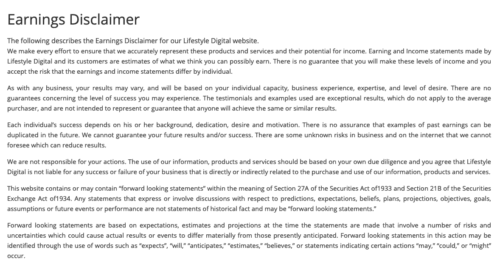
Earnings Digital, a website dedicated to all things to do with making money online has a thorough earnings disclaimer.
Testimonials
Does your website have testimonials from users who love your product or service? If not are you planning on adding some of these? If you said yes to either of these questions then a testimonials disclaimer is an important additions to your website legal products.
The testimonial disclaimer explains that just because that user had that experience, it may not necessarily represent the experience of all users.
Below is the testimonial disclaimer from a weight loss company "idealshape".
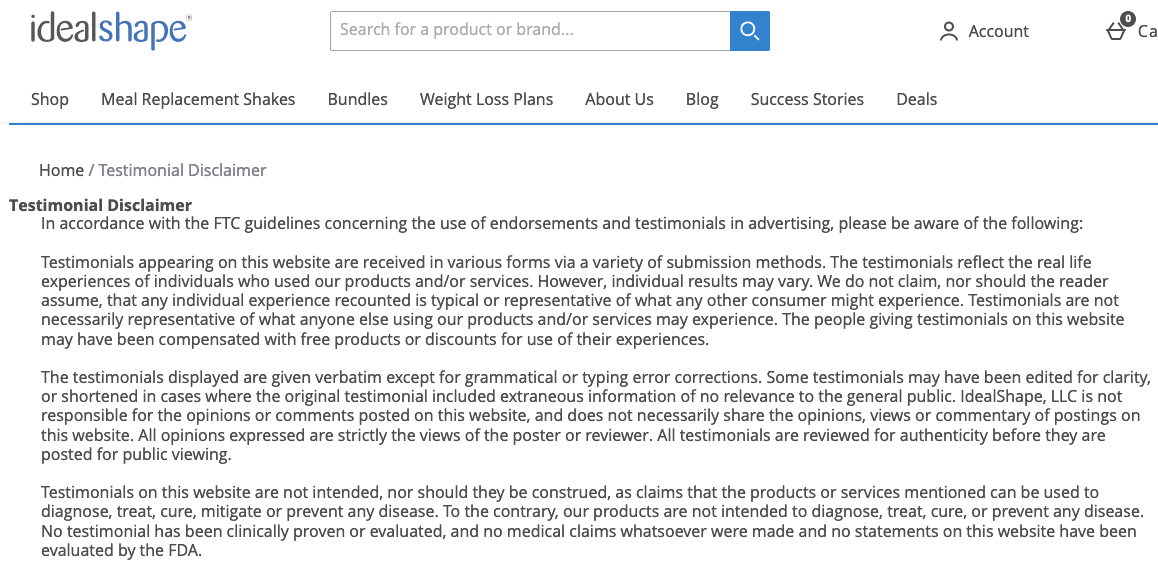
As you can see idealshape have expressed in their testimonial disclaimer that individual results may vary and that the testimonial results are not necessarily representative of everyone using their products.
Fitness

If your website offers fitness, health or nutritional information, you should consider adding the fitness disclaimer. The fitness disclaimer explains that your information is for educational purposes only and shouldn't be substituted for professional advice. It also helps limit any liability by suggesting that you consult your health care professional before beginning any fitness program.
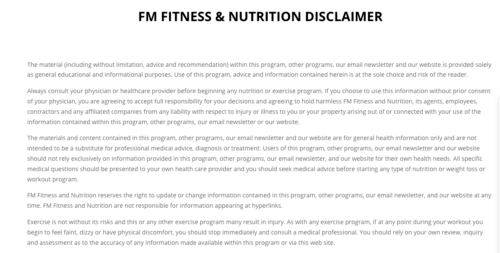
FM Fitness and Nutrition offer a great example of a fitness disclaimer.
Medical

Does your website offer any information on medical topics? If so it's important that you add a medical disclaimer to your legal documents.
The medical disclaimer will assist you in reducing any liability for the use of content on your site. Once again it should be stated that it is not a substitute for professional medical advice and advise users to seek medical attention immediately in the case of a medical emergency.
The DanneMiller website adds this medical disclaimer:

Legal

The legal disclaimer is a must have for any website that deals in any legal subjects. You need to ensure that your users are aware that there is no lawyer-client relationship between the two of you. It should also be noted that the content provided is only for informational purposes.
Here is an example of a legal disclaimer from Law Depot:
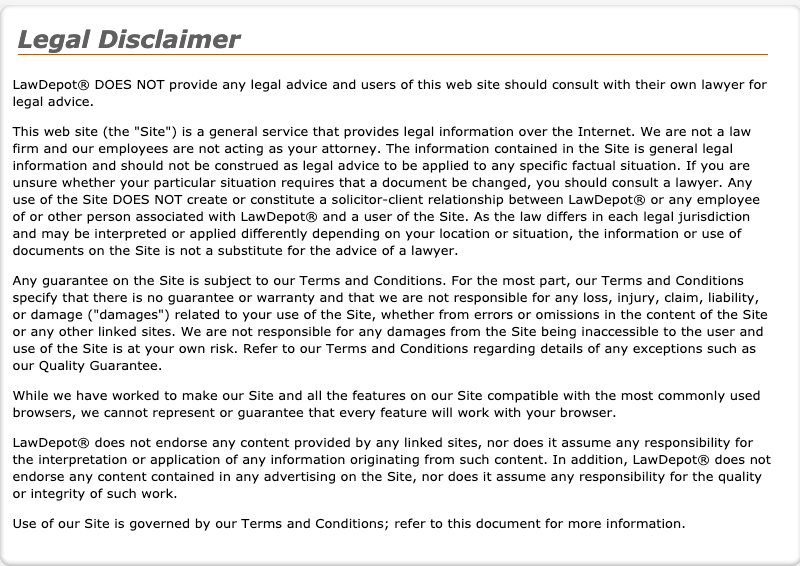
Social Media Channel
The social media channel disclaimer is a brief general disclaimer covering videos podcasts or other media you publish. It covers they are your copyrighted material.
Map Policy
Do you publish a Google Map on your website for directions? If so then you may wish to add this map disclaimer. It removes any idea that you have any opinion regarding anything that is shown on the map on your website.
Blog

Do you run a personal blog? Do you write informative articles which include your opinions or views? Yes? Then add a blog disclaimer to your website.
The blog disclaimer will help to minimize any legal liability with your website content and let your readers know that your posts are for informational purposes only. You are not liable for any injuries or damages for the use of your information.
Taipan Brokers website has added a Personal Blog disclaimer which covers this.
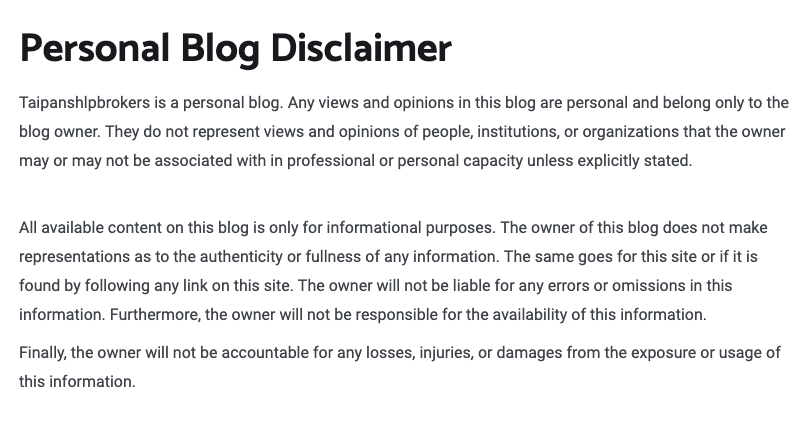
Product
If your website sells any products then it's advisable to add a product disclaimer which limits your legal liability with the products. It should also state that the use of the product is at the users own risk.
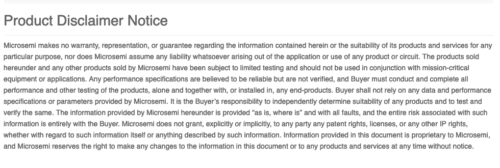
Microchips website has a product disclaimer that outlines the necessary information so that their customers understand that the purchasing and using of the products is their own responsibility.
Price Inaccuracies
The price inaccuracies disclaimer is useful for websites that sell products. It covers you in the event that prices on your website are incorrect and then you are not obliged to sell them to your customer at the erroneous price.
YouTube Video

A lot of websites embed YouTube videos in their posts on on their pages. If you are using content from YouTube, that is not your own, or you are using your own YouTube videos then having this disclaimer is helpful.
The YouTube video disclaimer lets your users know that the video is under YouTube's terms of service agreement and not yours, as the video is hosted on YouTube's servers. It also outlines that the content is not yours, in the case of using others content.
If it's your own content then it is still of use as it explains that the related links that are suggested by YouTube are not your responsibility.
Fair Use Notice
A fair use disclaimer clarifies that your website may contain material that you do not own the license to. You believe the use of copyrighted material on your website constitutes fair use. It also needs to specify section 107 of the US Copyright Law.
If you are using any copyrighted work then under the fair use act you are required to have a fair use disclaimer on your website.
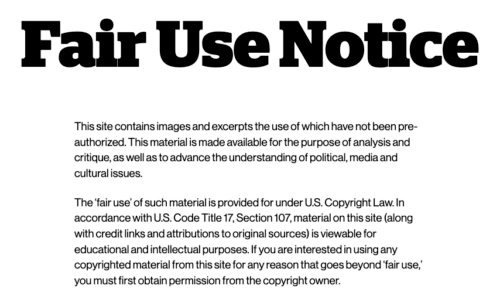
Personal Responsibility
The personal responsibility disclaimer is a general disclaimer, useful for all websites. It outlines that the person using your website is doing so voluntarily and that any actions they take are their own responsibility.
Conclusion
Disclaimers are a useful addition to any website. They help reduce legal liability in a number of areas that are not included in the terms and conditions agreement.
Disclaimers are generally short paragraphs that is intended to protect the content and services of your website.
Our disclaimer generator offers all of the above mentioned disclaimer statements. Some of the more generic ones are free, while there is a small charge for the more specialized ones. Our disclaimers were drafted by a lawyer, so you can feel secure knowing that your business has a solid disclaimer.
Disclaimer
The information in this article is for informational purposes only and should not be construed as legal advice on any matter and does not create a lawyer-client relationship
